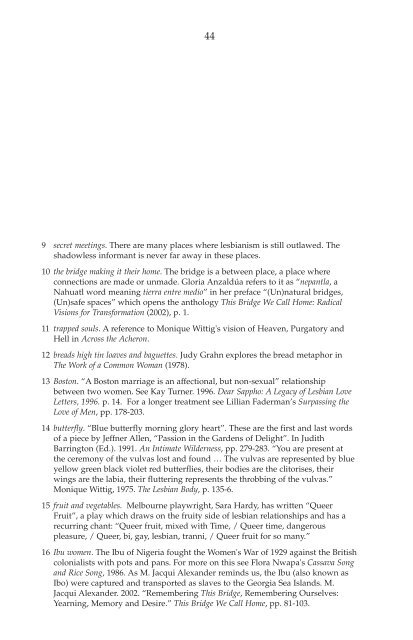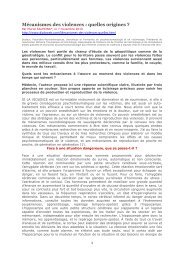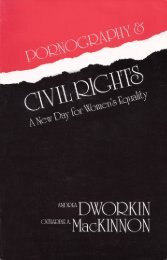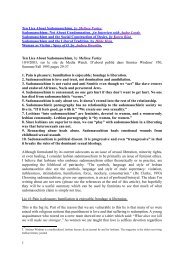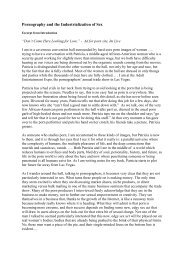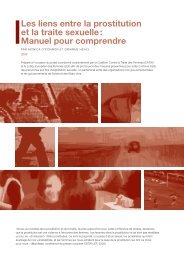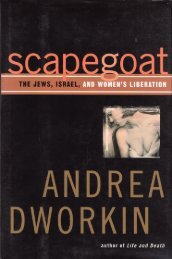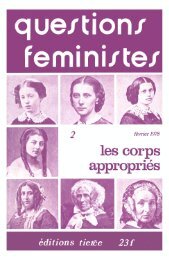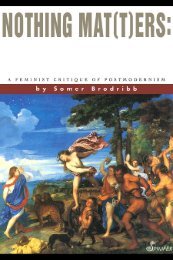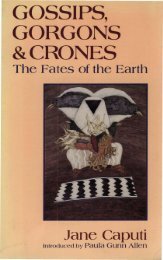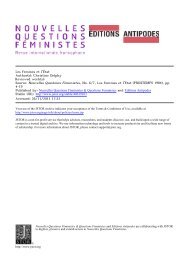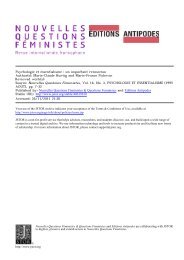Butterfly Effect - ressourcesfeministes
Butterfly Effect - ressourcesfeministes
Butterfly Effect - ressourcesfeministes
You also want an ePaper? Increase the reach of your titles
YUMPU automatically turns print PDFs into web optimized ePapers that Google loves.
44<br />
9 secret meetings. There are many places where lesbianism is still outlawed. The<br />
shadowless informant is never far away in these places.<br />
10 the bridge making it their home. The bridge is a between place, a place where<br />
connections are made or unmade. Gloria Anzaldúa refers to it as “nepantla, a<br />
Nahuatl word meaning tierra entre medio” in her preface “(Un)natural bridges,<br />
(Un)safe spaces” which opens the anthology This Bridge We Call Home: Radical<br />
Visions for Transformation (2002), p. 1.<br />
11 trapped souls. A reference to Monique Wittig's vision of Heaven, Purgatory and<br />
Hell in Across the Acheron.<br />
12 breads high tin loaves and baguettes. Judy Grahn explores the bread metaphor in<br />
The Work of a Common Woman (1978).<br />
13 Boston. “A Boston marriage is an affectional, but non-sexual” relationship<br />
between two women. See Kay Turner. 1996. Dear Sappho: A Legacy of Lesbian Love<br />
Letters, 1996. p. 14. For a longer treatment see Lillian Faderman’s Surpassing the<br />
Love of Men, pp. 178-203.<br />
14 butterfly. “Blue butterfly morning glory heart”. These are the first and last words<br />
of a piece by Jeffner Allen, “Passion in the Gardens of Delight”. In Judith<br />
Barrington (Ed.). 1991. An Intimate Wilderness, pp. 279-283. “You are present at<br />
the ceremony of the vulvas lost and found … The vulvas are represented by blue<br />
yellow green black violet red butterflies, their bodies are the clitorises, their<br />
wings are the labia, their fluttering represents the throbbing of the vulvas.”<br />
Monique Wittig, 1975. The Lesbian Body, p. 135-6.<br />
15 fruit and vegetables. Melbourne playwright, Sara Hardy, has written “Queer<br />
Fruit”, a play which draws on the fruity side of lesbian relationships and has a<br />
recurring chant: “Queer fruit, mixed with Time, / Queer time, dangerous<br />
pleasure, / Queer, bi, gay, lesbian, tranni, / Queer fruit for so many.”<br />
16 Ibu women. The Ibu of Nigeria fought the Women's War of 1929 against the British<br />
colonialists with pots and pans. For more on this see Flora Nwapa's Cassava Song<br />
and Rice Song, 1986. As M. Jacqui Alexander reminds us, the Ibu (also known as<br />
Ibo) were captured and transported as slaves to the Georgia Sea Islands. M.<br />
Jacqui Alexander. 2002. “Remembering This Bridge, Remembering Ourselves:<br />
Yearning, Memory and Desire.” This Bridge We Call Home, pp. 81-103.


